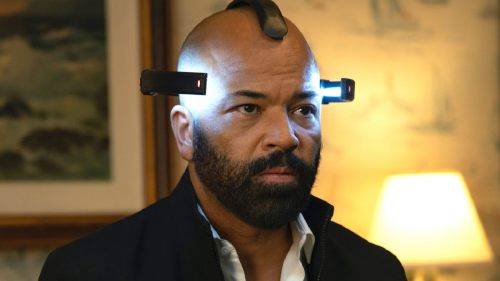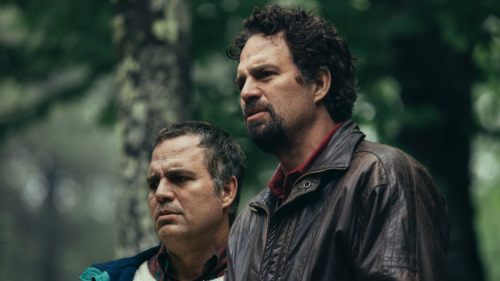OPEN THREAD: Let’s Discuss WATCHMEN’s “An Almost Religious Awe”
It should go without saying at this point, but the following article contains MASSIVE SPOILERS for the latest episode of Watchmen. Continue at your own peril.
As with almost every episode up to this point, there's a lot to unpack in "An Almost Religious Awe," which brings more of Angela's life into focus, reveals the Seventh Kavalry's master plan, and finally explains where the hell Doctor Manhattan's been hanging out. Oh, and there's a big-ass elephant in the room (literally). Watchmen also continues its astonishingly skillful weaving of a rich and complex thematic tapestry in an episode that hits on inherited trauma and our obsessive inability to leave the painful pieces of our past behind – to our own detriment, Lady Trieu explains, because in order to move "gloriously" into the future, we must see the past for what it is and leave it where it belongs.
We still don't know exactly what Trieu's Millennium Clock will do, and she refuses to divulge the specifics of her plan to save humanity from itself to Angela, who's recovering from her Nostalgia overdose at Trieu Industries. There's a tube coming out of Angela's arm and leading out of her room, where she's led to believe it's connected to her grandfather, Will Reeves, who is serving as a "natural host." The treatment will flush out Will's memories while abruptly resurfacing some of Angela's own, which is how we learn about her particularly horrible childhood in Saigon. Her father was a soldier, and her parents were killed in a bombing, leaving Angela to live in an orphanage. It's here that Angela develops her sense of justice when the local police ask her to confirm the identity of the man responsible for her parents' death, and Angela asks the female officer if she can listen. Angela's grandmother – her father's estranged mother and Will's ex-wife – comes to retrieve her from the orphanage, but that moment of hope is short-lived: after bonding over burgers, Angela's grandmother suffers a fatal heart attack. One woman's closure is the opening of another's wound.
Meanwhile, Laurie pays a visit to Judd's widow, Jane, and lays out a compelling theory based on Angela's drug-induced ramblings: Cyclops is the Seventh Kavalry. "I wouldn't be doing my job," Laurie says, "if I didn't at least entertain the idea that the chief of police in Tulsa was a secret white supremacist." Laurie posits that Senator Joe Keene (that Evil Coach Taylor-looking shithead) had the Seventh Kavalry kill a bunch of cops, forcing law enforcement to respond by putting their officers in masks, thus making it increasingly difficult to discern the good guys from the bad guys – since everyone is wearing masks and pledging their loyalty to the newly-elected leader, President Joe. What happens next is one of a couple of moments in "An Almost Religious Awe" where Watchmen subverts various tropes (comic book, procedural, its own predecessor): Widow Crawford captures Laurie with a trap door in her living room, but not before she casually admits guilt, noting that Laurie's theory was the "original idea," but "something extraordinary happened, and suddenly 'president' seemed a bit small potatoes."
Confronted by Keene in a Cyclops/Seventh Kavalry bunker, Laurie – the veteran masked crusader and seasoned FBI agent – apathetically rejects his attempt to deliver the villain's predictable exposition monologue. She already knows what he's going to say, and she doesn't give a shit – except Keene has an insidious Ace up his sleeve: they're going to capture Doctor Manhattan, destroy him, and become him. Why be a president when you can be a god?
Which brings us back to Angela and Lady Trieu. Some of the best scenes this week feature two women engaged in verbal chess matches; in an earlier convo, Trieu inquired about Angela's husband Cal and the car accident which rendered him completely amnesiac. This topic resurfaces when Angela breaks into the room where she believes Will is being kept to serve as her "natural host," only to discover a giant sleeping elephant in the room. She doesn't wake the elephant, but her subsequent conversation with Trieu serves as an initial rousing. Trieu has come to believe Will's assertion that Manhattan is living in Tulsa and pretending to be human. As Angela leaves, Trieu says it's rather interesting that Angela wasn't the least bit curious who Doctor Manhattan is pretending to be. When she returns home, Angela deploys the narrative equivalent of rudely waking someone up by dumping cold water on their head – only in this instance, the cold water is a hammer, and the head to which it brutally makes contact belongs to Cal Abar. It seems that this body is merely a vessel for Manhattan, and that he and Angela have been romantically involved for many years. They chose Cal's body "so they could be together"; unfortunately, the only way they could reunite is by bashing Cal's head in to retrieve a tiny silver (lithium?) object shaped like the Manhattan symbol, in which the good Doctor has been hiding. This raises some interesting questions regarding just how awake/aware Manhattan has been over the years and the extent to which Angela felt or didn't feel anything for Cal – a man who, it's implied, had his memories wiped and was essentially programmed to be Angela's husband.
For those who avoid previews of the following week's episodes, I just need to point out one thing: It seems that Manhattan is played by Yahya Abdul-Mateen II, at least vocally, which is an extremely thoughtful and compelling choice – one that speaks to Manhattan's "otherness" and his separation from the white human man he once was.
There are a couple of other things worth mentioning in "An Almost Religious Awe": Trieu reveals that Bian is actually a clone of her own mother, and she's been pumping a steady stream of Nostalgia into Bian's mind every night to slowly remind her of her identity so that Grandma Trieu can be present when her daughter saves the world. Meanwhile, in whatever weird-ass story Ozymandias is living out, he's placed on a year-long trial by the game warden and a jury of clones, who determine he's extremely guilt – not only for trying to escape, but for killing 3 million innocent people and playing god (a persona he's repulsively continued in his apparent captivity, where he's carelessly slaughtered countless clones for his own benefit and amusement). His single tear as the clones chant "guilty, guilty!" and point their fingers at him suggests there remains some semblance of a human being in Ozymandias, and that human believes he deserves to be punished for these crimes – perhaps this is a prison of his own design.
What do you guys think? We only have two episodes left, and it seems wild that Damon Lindelof & Co. could wrap all of this up in just a couple of hours or so. Share your predictions, thoughts, opinions, et al. in the comments and let me know if you're excited to see some more BLUE DONG.



